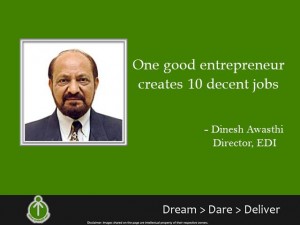The Speaking Tree – Parents’ Attachment To Children
Children are victims of the intense attachment exhibited by their parents. The love that parents bear for their children has metamorphosed into a dreadful form of attachment. This is happening universally because of the selfish trait in parents. The parental attachment to their beloved ones has turned into a deadly virus now sweeping the entire world. Few can claim to be free from the parents’ compulsive attachment to their children. However well-meaning they may be, their attachment turns the parent-child relationship sour and destructive.
Constant confrontation between parents and children invariably ends in separation, causing families trauma. The parents being innocent have no clue of the effects accruing from what they claim as love and care for their dear ones. Blissfully unaware of consequences, they dote on their beloved ones.
Parents’ attachment to their children manifests in two distinct ways:
1. Opulent parents pamper their children by showering money and ap pliances, amenities and facilities limitlessly upon them. The young are thus saturated with luxuries, only to lose their joy.
2. Another class of parents manifest their attachment through possessiveness towards their children. They virtually pester them with constant instructions and directions. They pound them with dos and don’ts, doctrines and dogmas. And their directives in variably fall short of reason or judgment.
In the first manifestation, the parents indiscriminately let loose money and sensual objects of all sorts upon the kids without restriction. The pampering starts with toys, tricycles and bicycles, later with Ferrari’s, yachts, jets and the works. Through indulgence in luxuries, children lose direction and purpose in life. It corrodes and ruins their lives. Neither parents nor kids anticipate the negative effects of such indulgence, that it could lead to a state when one loses the pleasure and joy derived from sense objects. And then one develops boredom which could drive one to commit serious blunders, even suicide. Nevertheless, well-meaning parents continue to pamper their children with sensual luxuries not realizing the impending damage to them.
With regards to the second manifestation, parents’ possessiveness fixes their kids in an iron casket. They are shackled by forceful directions and instructions. And when the parents constantly dictate their doctrines and dogmas to kids, they can take no more and buckle under the pressure. Then one of two dreadful consequences follows. Children become a `vegetable’ or a rebel! In the first case the kid turns inert and inactive, hardly responding to the external world. The kid reaches this state if his nature is passive and submissive and succumbs to the continuous on slaughts of his parents’ dictations. If, however, the kid is vocal and aggressive, he becomes a rebel. He would argue, swear, counter the unsolicited advices showered upon him. He could even turn violent, or leave home.
In either case, oppressive attachment of parents towards their children is a source of trauma to children even though such parents are well-wishing, well-meaning, caring parents! Parents ought to realise the blunder that their love and care lacks the support of a strong intellect. And their rigid controls flow from their emotional attachment rather than a discerning intellect. They must visualize the damage done and the dire necessity of developing the intellect in themselves and their children.
From the newly released book, The Holocaust of Attachment.
(Source : The Speaking Tree)
Famous Failures
“Failure is simply the opportunity to begin again, this time more intelligently!”
If you haven’t failed, you haven’t learned at all.
Here are some famous failures to inspire you to take failure positively:
1. Albert Einstein
When Einstein was young his parents thought he was mentally retarded. His grades in school were so poor that a teacher asked him to quit, saying, “Einstein, you will never amount to anything!” Also he didn’t speak until he turned 4 and didn’t read until he was 7.
We know him as the theoretical physicist widely regarded as the most important Scientist of the 20th century. He was awarded the 1921 Nobel Prize for Physics for his explanation of the photoelectric effect in 1905 and “for his services to Theoretical Physics”.
2. Walt Disney
Disney started his own business from his home garage and his very first cartoon production went bankrupt. During his first press conference, a newspaper editor ridiculed Walt Disney because he had no good ideas for film production.
Disney was an American film producer, director, screenwriter, voice actor, and animator. One of the most well-known motion picture producers in the world, Disney founded a production company. The corporation, now known as ‘The Walt Disney company’, makes average revenue of US $30 billion annually.
3. J.K. Rowling
At one point in her life, Rowling was nearly penniless, depressed, divorced and had to raise her child on her own. While writing the manuscript of Harry Potter, she was on welfare. Adding to that, 12 publishers rejected the manuscript.
She created Harry Potter, a global brand estimated to be worth $15 billion today.
4. Steve Jobs
At 30 he was left devastated and depressed after being unceremoniously removed from the company he started, Apple, after a power struggle with the Board Of Directors in 1985. Later, he acquired the computer graphics division of Lucasfilm, which allowed him to regain the funds needed to regain control of Apple.
An American entrepreneur and inventor, he is best known as the Co-founder, Chairman, and CEO of Apple Inc. Through Apple, he was widely recognized as a charismatic pioneer of the personal computer revolution and for his influential career in the computer and consumer electronics fields, transforming “one industry after another, from computers and smartphones to music and movies.” Jobs also Co-founded and served as Chief Executive of Pixar Animation Studios; he became a member of the Board Of Directors of The Walt Disney Company in 2006, when Disney acquired Pixar.
5. Michael Jordan
He was cut from his high school basketball team. Later became the greatest basketball player in history. He never let failure stop him.
Quoted by Jordan, “I have missed more than 9,000 shots in my career. I have lost almost 300 games. On 26 occasions I have been entrusted to take the game winning shot, and I missed. I have failed over and over and over again in my life. And that is why I succeed.” – Michael Jordan
As we can see, the most successful people have failed at some point of time which has led them to where they are today. Keeping the ‘Never Give Up’ attitude will only lead you to the path of growth. Success doesn’t come easy. Never let rejection get to you & bring you down. Entrepreneurs need to fight failure with a spirit of challenge.
Does this inspire you? Let us know.
[Top]Indian Women Entrepreneurs
Women have reached at a commendable level in the field of Entrepreneurship. They have started walking shoulder to shoulder with men. They have emerged as confident individuals who can fight all the odds and emerge as winners.
We have listed down Top 5 Women Entrepreneurs from India. Let’s find out more about them:
1. Kiran Mazumdar Shaw

She is the current Chairman & Managing Director of Biocon Limited, a biotechnology company based in Bangalore.
She finished her Bachelors in Zoology from Mount Carmel College, Bangalore University. She later did her post-graduation in Malting and Brewing from Ballarat College, Melbourne University. She worked as a trainee maker in Carlton and United Breweries, Melbourne and as a trainee maltster at Barrett Brothers and Burston, Australia.
She began Biocon in 1978 and spearheaded its evolution from professional enzymes manufacturing business to an entirely integrated bio-pharmaceutical company. Today Biocon under Shaw’s leadership has established itself as a respected player in biomedicine industry with an emphasis on diabetes and oncology.
2. Ritu Kumar
Ritu Kumar is one of the biggest names in Indian fashion industry.
She has carved a niche for herself in designing a variety of wardrobes including swimwear, eveningwear, traditional Indian wear, casual wear and formal evening gowns. She has the distinction of designing costumes of three winning Miss India’s.
3. Shahnaz Hussain
She is currently the CEO of Shahnaz Herbals Inc.
Shahnaz Hussain is the biggest name in herbal cosmetics industry in India. She has introduced a number of trend setting herbal products. Currently, the Shahnaz Husain Group has over 400 franchise clinics across the world covering over 138 countries.
Her pioneering work got recognition from Govt of India when she was conferred with prestigious Padma Shri award in 2006.
4. Ravina Raj Kohli
She is the Founder & Executive Director of JobCorp.
JobCorp is a company dedicated for empowerment of women. She has also been actively involved in inauguration of schools and educational institutions
Ravina Raj Kohli is an international media veteran with an experience of 24 years spanning across television and radio broadcasting, advertising, filming and journalism. Ravina is also Indian television’s first woman CEO.
She has earned a Diploma from the London School of Journalism, as well as a Bachelor’s Degree in Psychology, Economics and Literature from Bangalore University.
5. Vandana Luthra
She is the Founder and Mentor of the VLCC, India’s leading slimming, beauty and fitness brand, and one with seven outlets in Abu Dhabi, Dubai and Sharjah.
There are VLCC slimming, beauty and fitness centres in Muscat and Bahrain as well. The largest number of VLCC centres is in Ms. Luthra’s native India – 150 of them in 75 cities. She facilitates professional development through her vocational training school, the VLCC Institute of Beauty, Health & Management, which currently has 43 campuses in 35 cities.
Do you think there are more inspiring Indian women entrepreneurs running successful companies? Share with us.
[Top]Entrepreneurial lessons from FIFA 2014
FIFA World Cup 2014 has left us with a lot of memories.
So what did you learn from this World Cup?
Let’s find out:
1. Accept defeat:
Never blame others for your shortcomings. Apparently, in a couple of matches this season, some losing team members were found complaining about the nationality of the referees. How about just accepting your faults and moving on with a vision to work on your mistakes?
Blaming the referee for the nation he comes from is just an excuse to cover your mistakes.
2. Accept victory, but don’t overdo it:
Be happy about your victory, but don’t make your competitor feel unhappy. Consoling and appreciating their efforts will always lead to a healthy competition and maintain a good relationship.
Remember what happened when Brazil won over Colombia? Brazilian David Luiz consoled young striker James Rodriguez from Colombia, and asked the audience to applaud him.
3. Team is your strength:
Never underestimate team work. To get on top as an individual while working in a team might be a win for you but not for your team. When in a team, work with the team.
For instance, Neymar’s injury cost Brazil the world cup. It seems like Messi won as an individual, but Argentina lost as a team.
4. Learn from your mistakes and others’ too:
Brazil being a strong team lost to Germany. Only if they had learnt from the mistakes, they might have possibly won their next match against the Netherlands.
Meanwhile, Argentina analyzed the mistakes made by Brazil and bucked up for their final match against Germany. Though they lost, it was a close one.
5. Winners never have excuses:
If you are focused towards your goal, nothing can stop you. Coming up with problems that are not meant to be will lead to disgracing yourself and the society from where you come from. FIFA has seen many players in the past faking injuries and blaming referees for no reasons. This has only resulted to lower self esteem.
6. Be ready for constant efforts:
Tasting success today doesn’t mean you’ll be fed with it each day. You will have to struggle to stay on the top. Success comes to those who work hard for it. By hard we mean really hard.
It took Germany 14 long years to prove themselves as a team with great co-ordination.
7. Make your vision and mission visible:
It is important for you to sell your vision and mission well. A good explanation will lead to acceptance. All the concerns should be addressed and questions need to have satisfactory answers.
For instance, a criticism was raised on Brazil for hosting the largest sports tournament in the world. How can a country with so much poverty host such an expensive event? It was taken into account that Brazil was the only country with a surplus budget previous year. Apart from this, the government said that the developmental impetus for construction workers, the exposure for the local residents, and the atmosphere it creates are immeasurable.
8. Be sporty, stay in the game:
If you lose, doesn’t mean you are out. Stay cheerful and enjoy watching others play their part. Life doesn’t come to an end if you are out of the game.
Neymar suffered injury and couldn’t play anymore. His dream to play the world cup came down crashing. But he was sport enough to still enjoy the game. He cheered in support of Argentina & Messi for the finals.
Next time, while watching a sport, view it with a leadership perspective & observe the hidden wonders it teaches.
Comment your inputs.
[Top]
One good entrepreneur creates 10 decent jobs – Dinesh Awasthi
On June 23, an interview of Dinesh Awasthi, Director at EDI, got published in the Financial Express.
 Established in 1983, the Entrepreneurship Development Institute of India (EDI)—in Gandhinagar, Gujarat—is an autonomous body and not-for-profit institution, and is sponsored by apex financial institutions, namely IDBI Bank, IFCI, ICICI and the State Bank of India. EDI is registered under the Societies Registration Act 1860 and the Public Trust Act 1950.
Established in 1983, the Entrepreneurship Development Institute of India (EDI)—in Gandhinagar, Gujarat—is an autonomous body and not-for-profit institution, and is sponsored by apex financial institutions, namely IDBI Bank, IFCI, ICICI and the State Bank of India. EDI is registered under the Societies Registration Act 1860 and the Public Trust Act 1950.
Dinesh Awasthi, Director, EDI, is an economist with extensive experience in entrepreneurship education, research and training. He has worked extensively on policy issues related to SMEs with several multilateral agencies such as ILO, UNIDO and UNDP as a consultant on several international assignments. Awasthi is a member of various apex committees and core groups of ministries of MSME, urban employment and poverty alleviation and Department of Science & Technology. In a free wheeling interview with FE’s Nirwa Mehta, he discusses the prospects for entrepreneurs in India. Excerpts:
How have the past few years been for entrepreneurs?
The past few years have been very encouraging. Until 1991, the economy was stifled because of restrictions, quotas, permits and red-tapism. Innovative and creative entrepreneurship was the casualty of crony capitalism. However, after the liberalisation, privatisation and globalisation which encouraged free flow of capital goods and services, India started becoming a global market. Until 2000, it was a period of adjustments and restructuring, but post 2000 there has been a growth period. The advent of IT substantially improved India’s image. This led to knowledge-driven technologies such as biotechnology and nanotechnology. As government started opening up to ideas, an ecosystem has been created to encourage individuals to come up with innovative products.
What are your views on rural entrepreneurship?
Today you cannot ignore the rural market. Rural growth has been higher than the urban growth and because of that, rural demands have gone up. For every company, rural penetration is a priority. For an entrepreneur, there are possibilities at every stage of supply chain. The government has also started focusing on food processing industries and there are very high possibilities for the same in the rural sector. Today there are better roads, better connectivity and more means of transport which leads to growth in the services sector in rural areas.
How do you see growth in social entrepreneurship?
Social entrepreneurship is an emerging sector. It has been only 5-7 years since it came up. There are a lot of NGOs which work solely on grant basis. Once the grant is over, the work also stops and hence it is not a sustainable model. But, over time, entrepreneurs have realised that there are unmet demands in the market. On a global level, there is unmet, under-met and under-served demand of about 4 billion people, or 12 trillion dollars. There is a huge scope if people are willing to look at it as a profitable market. Teach for India has been a great example of the same. It led to quality teachers and teaching quality improved at a relatively low cost. We are contemplating projects in Assam to electrify 100 villages which are out of reach of regular transmission lines. The idea is to create local power supply system which is managed by people to supply electricity to the villages. There is also a project from the Department of Science & Technology that addresses concerns of non-conventional sources of energy, food processing and bamboo projects in the North-East. We want to create 500 medium-scale industries in the North-East in the next five years.
What has been the success ratio of start-ups in India?
It is estimated that 40% of the start-ups fail in the first 1,000 days of starting. India success ratio more or less mimics the global standards. In India, about 60-70% of the start-ups manage to stay afloat and are doing well.
What are the challenges faced by the entrepreneurs?
Most start-ups are started by people with science or engineering backgrounds. People here are in love with their idea and think they have a miracle with them. They tend to ignore the market demand. Lack of proper assessment of market is the biggest challenge they have. The second challenge is finance. But for ideas which have potential, money is not a problem. More than procuring money, managing money is the problem. If the market is there and the idea is viable, finance follows. The challenge is to make optimum use of finance. The third challenge is to find the right resources. When you are starting out, you are not in a position to pay well, but you will need a better team to showcase yourself as a brand. This is where the next challenge comes in. Who will be on the board? Who will be your mentor? Who are the people to guide you? You need a team which is good enough to create a brand.
What are your expectations from the new government?
Prime Minister Narendra Modi has created a new ministry—the ministry of entrepreneurship—which I think is a commendable step. For the first time space has been created for entrepreneurship and we are looking forward to working closely with them. The primary thing on their agenda should be to create an entrepreneurship policy to create an ecosystem. Putting together a policy and a systematic movement is the first step in building a healthy, cohesive ecosystem. I hope the government is more open and encouraging. But I am hopeful as Modi is a business-friendly politician. Creating employment opportunities is also on his agenda and that can only be done by creating entrepreneurship opportunities. One good entrepreneur creates 10 decent jobs and hence it is in the interest of the government to promote entrepreneurship in a big way.
[Top]Entrepreneurial Inspiration
Welcome inspiration & life will be easy. We would like to share these 10 great quotes we came across.
1. “It’s fine to celebrate success but it is more important to heed the lessons of failure.”
2. “One of the huge mistakes people make is that they try to force an interest on themselves. You don’t choose your passions; your passions choose you.”
3. “I have not failed. I’ve just found 10,000 ways that won’t work.”
4.“If you cannot do great things, do small things in a great way.”
5. “Entrepreneurship is living a few years of your life like most people won’t so you can spend the rest of your life like most people can’t.”
6. “Success is not the key to happiness. Happiness is the key to success. If you love what you are doing, you will be successful.”
7. “The most valuable thing you can make is a mistake- you can’t learn anything from being perfect.”
8. “Your most unhappy customers are your greatest source of learning.”
9. “Make it happen now, not tomorrow. Tomorrow is a loser’s excuse.”
10. “In order to succeed, your desire for success should be greater than your fear of failure.”
We are sure there is a quote that always inspires you. Share it with us 🙂 Self made quotes are welcome too !
[Top]Facilities at EDI
Campus-
EDI is set in a rural and amidst verdant surroundings; the aesthetically designed campus with a simple yet elegant structure is a judicious blend of the major influences on architecture-Hindu, Islamic and European. The buildings are developed around inner courtyards and loggias which are a major source of light and ventilation. It is interspersed with sprawling lawns, thick leafy trees and flora that match the quiet dignity of the solid facade that generates very specific elements and expression.
The EDI campus is one of the best maintained educational campuses anywhere in the world. The campus has been awarded the prestigious `Aga Khan Award for the Best Architecture’ in the year 1992. The award jury adjudged it to be a place with an “inviting environment for work, interaction and repose.”
Recreation facilities include music room, satellite television viewing and a range of competitive sporting activities. The immediate surroundings of the campus are unspoiled and ideal for walking and jogging.
Library-
EDI Library and Information Centre (EDILIC) is enriched with updated information resources on Entrepreneurship and related subjects and it is an information resource centre of national and international repute.
Library Timings:
The library functioning hours are 08:00 a.m. to 12:00 a.m.(midnight)
(Library will be closed on the public holidays observed by the Institute.)
Library Collection:
EDI’s library is equipped with a large number of text and reference books on entrepreneurship and related subjects. The EDILIC endeavours to support the teaching, research and academic needs of the faculty, students and participants of the programmes, through books, journals and other reading material. The total collection of EDILIC is more than 25000 which includes books, CDs, back volumes and other materials, selected after carefully scrutinised by the Library Advisory Committee.
Reference Material:
EDILIC has fairly strong reference section consisting of
- Text Books
- Reference Books
- Research Reports
- Handbooks
- Directories
- Serial Publications
- Encyclopaedias
- Dictionaries
- Working Papers
- Economic and Industrial Surveys
- Newspaper Clippings
- Biographies of Entrepreneurs
- Project Profiles on Products
- Business Opportunities
Journals/Periodicals/Newspapers:
EDILIC is subscribing 160 national and international journals in the field of entrepreneurship and related subjects. EDILIC also subscribes to 30 Newspapers published within the country.
Audio-Video Collection:
EDILIC has a collection of 200 videocassettes produced by EDI and other organizations and 2500 CDs/DVDs/VCDs. The library offers facility of in-house viewing of videocassettes and CDs/DVDs.
Institutional Membership:
EDILIC is an institutional member of Indian Institute of Management-Ahmedabad, Indian Library Association (ILA), Indian Association of Special Libraries and Information Centres (IASLIC), Management Libraries Network (MANLIBNET) and The British Library, Ahmedabad. Apart from this, EDILIC is regularly using services of Ahmedabad Library Network (ADINET) and Information and Library Network Centre (INFLIBNET).
Computer Centre-
EDI provides world class computer facilities to its students/participants. The campus is Wi-Fi enabled. A dedicated leased line of 8.5 Mbps facilitates high speed internet access to the users.
Four laboratories with latest computing facilities are available to the students from 08:00 a.m. till 11:00 p.m. Students also have access to web-based ERP (college management), mobile application and a fully-featured Digital Language Laboratory.
Hostel-
Residential Facility: The campus has well-designed, well-furnished and comfortable air-conditioned and non-air-conditioned residence halls for participants and students. In addition, there are 96 newly constructed hostel rooms for boys on twin-sharing basis (air conditioned and non-air- conditioned) with attached bath.
For girls, we also have a separate hostel on campus (NARMADA) on twin-sharing basis with attached bath. The dining halls are elegantly furnished with enough seating capacity. The food and hospitality of the Institute are always acclaimed.
Sports & Recreation-
The institute offers its students a wide range of intellectual and interactive sports and cultural activities which enhances and completes the student’s academic experience. Most of the cultural and sports activity are ‘students initiative’, i.e. they are designed and formulated by our students. It not only makes them creatively participate in these events, but also helps them learn the art of event organization and management.
EDI not only believes in growth on the educational front but promotes overall growth as well. With the latest technology available at the campus, it becomes more convenient for the students to do their research & pursue higher knowledge in the field. Apart from just bookish knowledge, our expert & well- educated faculty members also train them practically.
Have a question to ask or a suggestion to give about our campus? Let us know !
[Top]SMEs must constantly re-invent themselves to survive: Dinesh Awasthi
On June 9,2014, interview of Dr. Dinesh Awasthi, Director at EDI appeared in Business Standard.
Ever since its inception in 1983, the Entrepreneurship Development Institute of India (EDI) has not only spawned new start-ups, many of which have gone on to become sustainable small and medium enterprises (SMEs), but also served as a think tank in helping the government develop SMEs, says Dinesh Awasthi, Director, EDI, in an interview with Vinay Umarji. Edited excerpts:
What factors have helped encourage entrepreneurship in India in recent years?
Let’s go back to 1991 when liberalisation changed the rules of the game. It became much easier to set up a business. Before 1991, the economy was supply-driven; after 1991 it became demand-driven. Suddenly, the consumer became king. Earlier, SMEs had a limited role to play while quality and technology were casualties. There was a restriction on quantity of production.
However, post-liberalisation and by the late 1990s, young people saw opportunities in setting up their own enterprises. This was also the time for advent of technology and knowledge-based economy. So even without much capital base, you could become a businessman and make money legitimately.
So while liberalisation was a major factor, the opening up of technology and knowledge-based economy too encouraged setting up new ventures. In fact, most of the businesses were set up by people who were in their thirties.
Today too, at EDI and across India, students have a killer instinct and don’t want to talk small.
Has this led to a problem of plenty in terms of too many start-ups being added to the already large number of SMEs present in India?
I don’t think so. The top slot among SMEs is always vacant. Many SMEs fail too after being set up. But we have to change the mindset and start seeing failure as an opportunity, the way our western world counterparts do.
In fact, one of the statistics suggests that in the first 1000 days of setting up a new business, 40 per cent of start-ups in any country globally shut down. So those who can compete will survive. Gone are the days of best practice, nowadays it is about next practice.
Unless SMEs constantly re-invent themselves, it will be hard for them to survive and there won’t be a problem of plenty.
Are there are enough resources available for SMEs to flourish in India? What is lacking?
Why does one produce? You produce for the market. Resources are never constant for SMEs in India. As far as demand is concerned, India has insatiable demand and people will continue to demand more and more.
The market is bursting with opportunities for SMEs.
What challenges still plague entrepreneurial SMEs in? How can they overcome them?
Most of the SMEs are being run by old hats. Their way of operating is not changing. Our students at EDI complain that their fathers don’t allow innovation in their family businesses.
SMEs are yet to value innovation and yet to learn to invest heavily in technology. You will not be able to capture the global market without quality and innovation.
[Top]Planning to Start-Up?
Do you have a brilliant idea in mind? Do you think it will take you places?
Hold on! Make sure to have these things in mind before you start-up.
1. Own your name. Get in with the law:
Make sure that the name of your company is available for trademark. Check if an internet domain name is available. If you fail to do so, this may put your business to risk. What’s the use of owning a company if someone else owns the trademark?
Understand what regulations, licenses and taxes you will need to follow, obtain and pay for your new business. After doing some initial research on your own, consult with a lawyer and accountant to confirm your understanding and to help structure your business to be in compliance with the law.
2. Mission & vision:
Firstly, find out the difference between the two. Second, be clear. Jot it down. Make clarity on paper what exactly is your purpose of starting up with your idea. Where will it lead to. If you are confused, your business will be in a huge mess in a matter of months. Keep it simple & make it clear in your head what is it all about, what will it do & what it will represent. Once done, move ahead with your plan.
3. Find your niche:
Finding your niche is a very important factor for achieving success. Find out what are you really good at and can take it ahead in the best possible way. Do a lot of research, ask people and brainstorm with fellow mates regarding it. See what others are doing and how. Take an inspiration but never follow others in the same market.
4. Nothing is impossible:
We all know that impossible = I M Possible!
When you are stuck in a situation, giving up might seem to be the easiest way out. Giving up is no solution. There is always a way out of difficult situations. If you hold on you are sure to cross the bridge between trial & success.
5. Find the right team:
Get the right people on the bus. How to find out if a person will fit just right? Can you transform an odd-for-the-job person into a right one? Talent management will be one of the hardest things you’ll come across. What is important is to have the right person, at the right time doing the right job. If you ask a fish to climb a tree, the fish will believe all its life that it is stupid. Your team should be open to criticism and learning new things. Rigidness won’t work. You also have the option of training the person in the way you want them to perform.
6. Never stop learning:
We are not perfect and there is always a scope of learning more and in a better way. Welcome new things in your career. Never say no to an opinion or suggestion. Keep the suggestions pouring in, write them down and keep the ones you think will help you in the long run.
7. Working with and understanding your co-founders:
Your partner is your support. Know them as a person, keep it clear who will do what and document it. It is very important to have clear and complementary skills. Be in constant communication & keep each other well informed.
8. Ditch your safety net:
A backup plan is crucial. If you think you have a plan A & pretty sure it might work, you might be entering the risk zone. Plan B is very essential to keep that boat sailing at all times.
9. Raising a lot of money doesn’t mean you’ll get a high salary:
This is wrong notion with which people start a business. If you want to take back home a heavy 6 figure salary, your business should be earning more and more each year. High salary would increase the overall burn which means you’ll have to earn more money faster which could cause more dilution. If you are going to raise capital, don’t be dumb by paying yourself a lot of money. That will just cause you to have to raise more money, which means you will own less of your own company.
10. 90% of start-up networking events are a waste of time:
Most of the things you learn in a start-up event are something you can learn online too. One is paid and the latter is free. There are a very few networking events that you must not miss. Check the list of people coming, if they are smarter than you, then make it a point to attend the event. Your main purpose should be learning new things and not teaching others on how to run a company. Make sure the place is filled with potential clients.
11. Successful people don’t always know what’s best:
You will come across a lot of successful entrepreneurs in your journey to success. And you will receive hundreds of advices. You ought not to follow them all. The thought that ‘who are we to question the advice of a successful person’ is a wrong idea all of us carry. Question each advice and find a good reason to follow it. You might be good at web development and you are advised to get into gaming. Not every advice is a correct advice. Choose wisely.
12. Don’t believe the hype. Customer satisfaction is more important:
Once you strike a big deal and deliver fairly well, your client will pour in lots of appreciation. But did your work make your customers happy? Be sure to not let the appreciations get to you when it comes to delivering. Your family, friends & colleagues might talk about the great work you are doing, but give priority to your customer. If they are happy, only then you should start believing that the quality of your work is worth an appreciation.
Are we missing out on something? Let us know 🙂
[Top]Book – An Entrepreneur’s best friend
We are here with a list of top books every entrepreneur must read. These will give you the best of experiences from the outer world. It will teach you how to come out of the box and try new things, how to face challenges, how to achieve goals & many more things that you will come across in the journey of entrepreneurship.
Let’s check out the list:
1. How to win friends and influence people by Dale Carnegie-
This book has been called the “grandfather of all people-skills books” because it has been assisting everyone from the rich and famous to successful business leaders for more than 80 years. The reason that this title remains useful and popular is because it describes techniques for handling other people, like six ways to get people to like you, 12 ways to encourage others to buy into your thinking or nine ways to change people’s minds without any resentment.
2. Enchantment by Guy Kawasaki-
What’s the difference between spending your money on something that immediately gives you buyer’s remorse and the angels-are-singing delight that comes with a real treasure? Enchantment. Guy Kawasaki unpacks this concept in a way that leaves you nodding along with his suggestions. As an entrepreneur, you’ll find more than a few gems in this to get you thinking about how to really take care of your customers. As a customer, you’ll be looking for businesses that employ this kind of caretaking so you can support them further.
3. 7 habits of highly effective people by Stephen Covey-
The book first introduces the concept of paradigm shift and prepares the reader for a change in mindset. It helps the reader understand that a different perspective exists, a viewpoint that may be different from his or her own, and asserts that two people can see the same thing and yet differ with each other. Once the reader is prepared for this, it introduces the seven habits in a proper order. Read the book to know the 7 habits.
4. The Fountainhead by Ayn Rand-
It is a story of an intransigent young architect, his violent battle against conventional standards, and his explosive love affair with a beautiful woman who struggles to defeat him. As fresh today as it was then, it is a novel about a hero and about those who try to destroy him.
5. The Alchemist by Paulo Coelho-
This classic story teaches us about the essential wisdom of listening to our hearts, learning to read the omens along life’s path and above all following out dreams.
6. The $100 start-up by Chris Guillebeau-
If you’ve ever been discouraged thinking that first-time business owners must have access to capital or be wealthy already, this book will shatter those misconceptions. This is a particularly a great book because it follows entrepreneurs with under $100, who have launched profitable businesses.
7. Finding your way in a wild new world by Martha Beck-
This book provides some crazy-challenging personal inquiry that will speak directly to your inner entrepreneur. If you approach this with the idea of outing your real and passionate business self, you’re going to get rather serious rather quickly about what you’d actually like to do to make money. The spiritual and self-help aspects of this book will speak directly to your soul. Give this book a try—you may be surprised how pragmatic these tools are.
8. The Lean Start-up by Eric Ries-
This classic touts the principles of spending little, being comfortable with uncertainty, and pivoting quickly when direction must inevitably change course. Whether an entrepreneur is a business veteran who has experienced the highs and lows of the great dotcom bubble or a young, inexperienced newcomer, a long-standing set of rules and suggestions are typically offered for certain scenarios, such as when it’s wise to turn to a focus group or just remain optimistic.
9. The Innovator’s Dilemma by Clayton M. Christenen-
Harvard professor Clayton Christensen, who has founded a handful of companies on his own over the years, delivered one of the most respected and useful books for entrepreneurs about 17 years ago. Its power lies in the assertion that even though things are done correctly, a company can still vanish. Other takeaways from this modern-day classic are insights about when a businessperson should not listen to customers, the appropriate times to select smaller markets over larger ones and the right moment to invest in development of lower-performance products.
10. The power of habit by Charles Duhigg-
This book takes us to the thrilling edge of scientific discoveries that explain why habits exist and how they can be changed. Distilling vast amounts of information into engrossing narratives that take us from the boardrooms of Procter & Gamble to sidelines of the NFL to the front lines of the civil rights movement, Duhigg presents a whole new understanding of human nature and its potential. At its core, The Power of Habit contains an exhilarating argument: The key to exercising regularly, losing weight, being more productive, and achieving success is about understanding how habits work. As Duhigg shows, by harnessing this new science, we can transform our businesses, our communities, and our lives
Today a reader, tomorrow a leader!
You must have heard this quote, but how do you justify it? Share your views.
[Top]




















